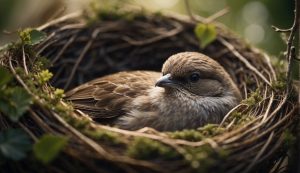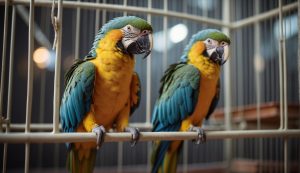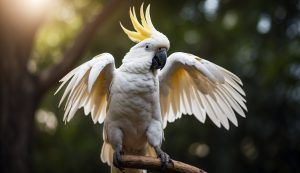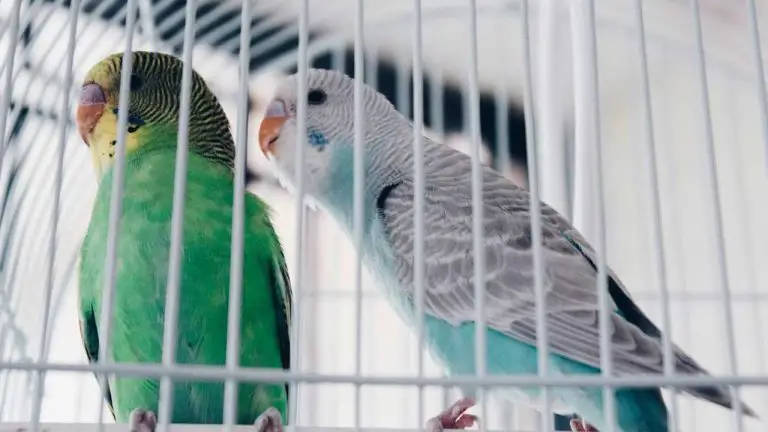Do African Greys Get Along with Other Birds? Get the Lowdown on Parrot Pairings!
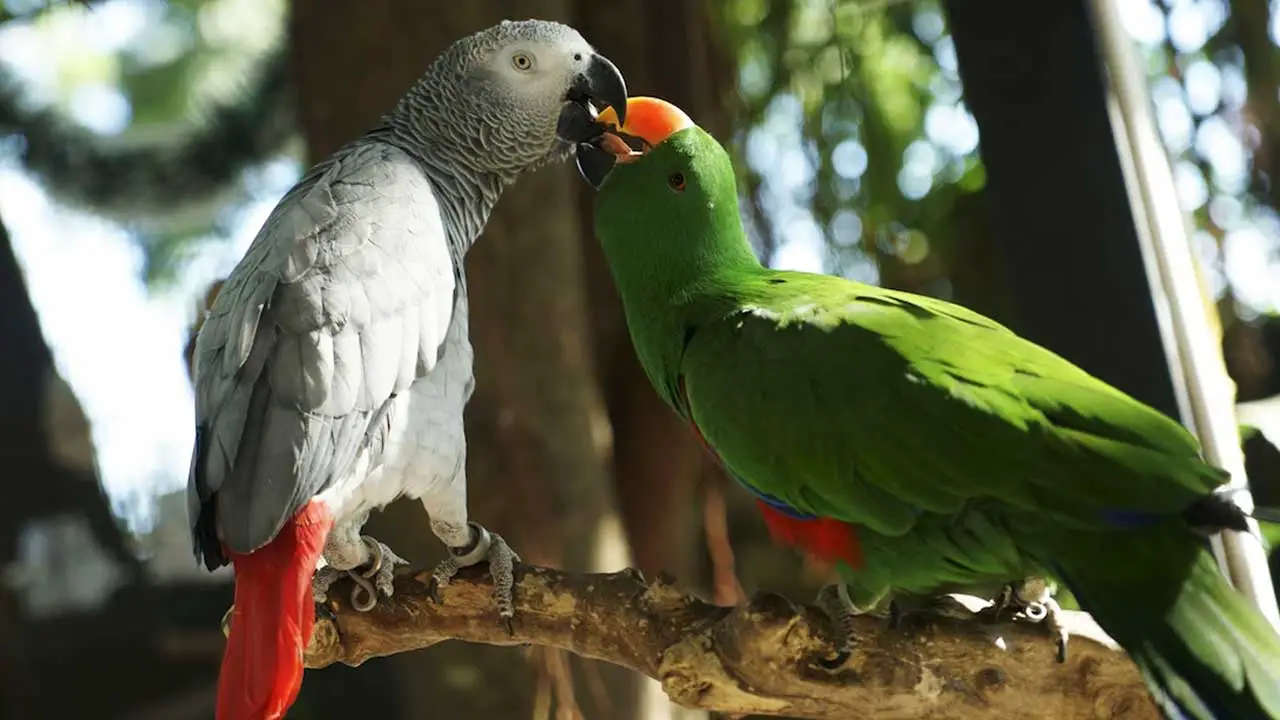
African Greys are popular birds for a reason. They are intelligent, and social, and make great pets.
But if you’re considering getting an African Grey, you may be wondering if they get along with other birds.
After all, you don’t want to introduce a new bird to your home only to have your African Grey reject them.
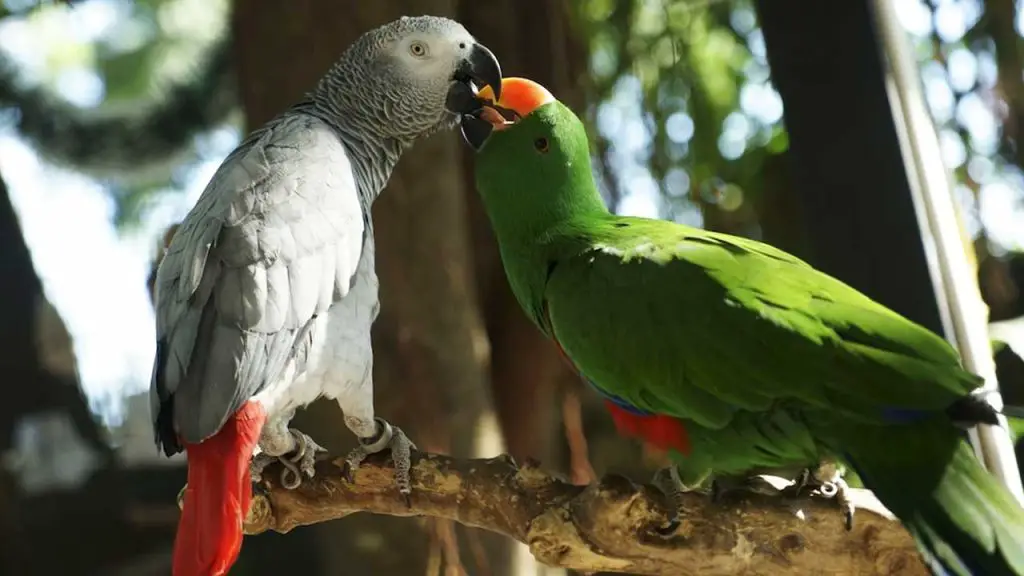
Short Summary
The answer to whether African Greys get along with other birds is not a simple yes or no.
It depends on a variety of factors, including the individual bird’s personality, the species of the other bird, and the way the birds are introduced.
Some African Greys may be friendly towards other birds, while others may be more territorial and aggressive. It’s important to do your research and understand the potential risks before introducing a new bird to your African Grey’s environment.
In this article, we will explore the topic of whether African Greys get along with other birds.
We will look at the different factors that can influence their behaviour towards other birds, as well as tips for introducing a new bird to your African Grey’s home.
Whether you’re a current African Grey owner or considering adding one to your family, this article will provide valuable information to help you make an informed decision about introducing other birds to your African Grey’s environment.
Table of Contents
Understanding African Greys
What Are the Physical Characteristics of African Greys?
African Grey parrots are medium-sized birds that can grow up to 33 cm in length and weigh up to 450 grams.
They have a distinctive grey plumage with a white mask around their eyes and a bright red tail. They also have a powerful beak that can crack open hard nuts and seeds.
Male and female African Greys look similar, but males tend to be slightly larger than females. They also have a larger head and beak compared to females.
One unique physical characteristic of African Greys is their ability to mimic human speech. They have a complex vocal system that allows them to imitate sounds and words with incredible accuracy.
What Are the Behavioural Characteristics of African Greys?
African Greys are highly intelligent birds that require a lot of mental stimulation to stay healthy and happy. They are social animals that love to interact with their owners and other birds.
They are also known for their cautious and shy nature. African Greys can be slow to trust new people and may take some time to warm up to strangers.
However, once they develop a bond with their owner, African Greys can be incredibly affectionate and loyal companions. They enjoy spending time with their owners and love to be included in daily activities.
It’s important to note that African Greys can be territorial and may not get along with every bird. Living in pairs can be beneficial for an African Grey’s health, but there is no guarantee that they will live peacefully with a different species.
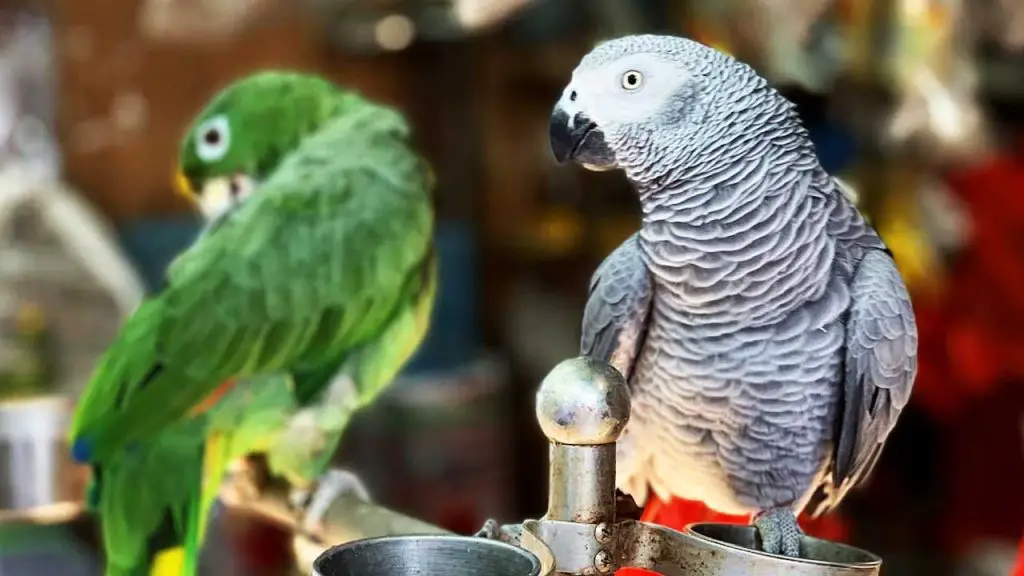
Social Behavior of African Greys
African Greys in the Wild
In the wild, African Greys are social birds that live in large flocks. They are highly intelligent and have complex social structures. They communicate with each other using a variety of vocalizations, including calls, whistles, and mimicry of other birds and sounds in their environment. African Greys in the wild are known to form strong bonds with their flock mates and are often seen preening each other or engaging in play behaviors.
African Greys in Captivity
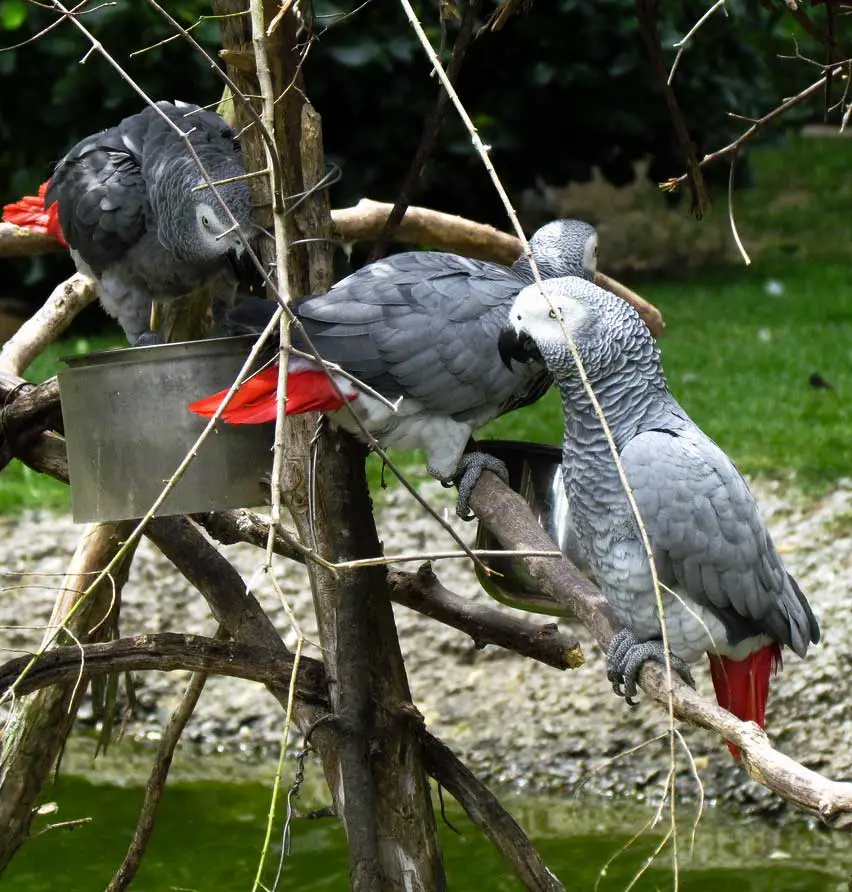
African Greys in captivity also exhibit social behaviors, but their interactions can be influenced by their environment and the presence of other birds. African Greys are known to be highly social and do best when kept in pairs or small groups.
They can get along with other birds, but it is important to introduce them gradually so that they can get used to each other. It is also important to make sure that all the birds have enough space to live comfortably.
Living in pairs can be beneficial for an African Grey’s health, as they provide social interaction and stimulation. However, African Greys will not get along with every single bird. There is no guarantee your African Grey will live peacefully with a different species. It is important to supervise interactions between birds and provide plenty of space and resources to avoid competition and aggression.
How to Introduce African Greys to Other Birds
Introducing African Greys to other birds can be a positive experience for your pet, but it requires careful consideration and planning to ensure a successful introduction.
In this section, we’ll discuss some pre-introduction considerations, as well as tips for introducing African Greys to other African Greys and other bird species.
Before You Introduce Them…
Before introducing your African Grey to another bird, there are a few things to consider:
- Age: Younger birds are generally more adaptable and may be more accepting of a new companion.
- Health: Both birds should be in good health before being introduced to each other.
- Gender: African Greys tend to be more accepting of birds of the opposite sex, but same-sex introductions can also be successful.
- Enclosure: Make sure the enclosure is large enough for both birds and has plenty of perches and toys to keep them occupied.
Introducing African Greys to Other African Greys
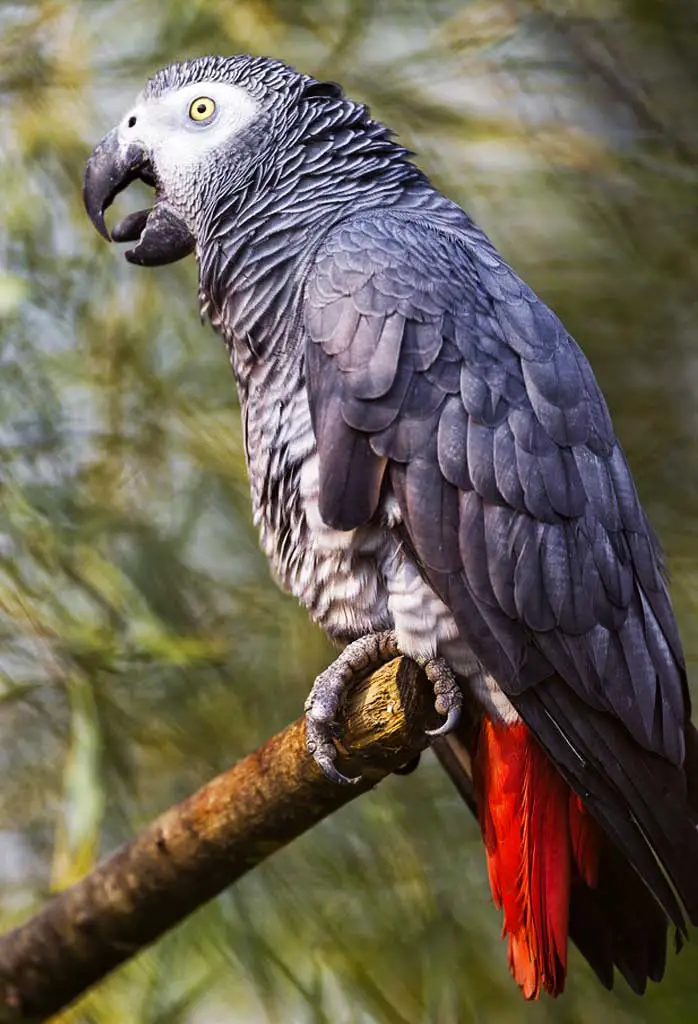
African Greys are social animals and can benefit from living in pairs. When introducing two African Greys to each other, it’s important to do so gradually:
- Start by placing the birds in separate enclosures next to each other so they can see and hear each other.
- After a few days, you can allow the birds to interact through a mesh barrier.
- If the birds seem comfortable with each other, you can slowly introduce them to the same enclosure under close supervision.
Introducing African Greys to Other Bird Species
Introducing African Greys to other bird species can be more challenging, as African Greys can be territorial and may not get along with every bird. Here are some tips for introducing African Greys to other bird species:
- Start by introducing the birds in a neutral space outside of their enclosures.
- Supervise the birds closely and be prepared to separate them if necessary.
- If the birds seem comfortable with each other, you can gradually move them closer to each other’s enclosures.
- Monitor the birds closely for any signs of aggression or stress, and be prepared to separate them if necessary.
How Long Do African Greys Live?
You probably know it already, but African Grey parrots are fascinating creatures to be around.
When considering them as pets, one common question arises: How Long Do African Greys Live?
On average, African Grey parrots have an impressive lifespan of 40 to 60 years, with some of them living even longer, up to 80 years!
Their longevity is a result of their highly social and intelligent nature, which requires mental stimulation and interactive engagement.
To ensure a long and healthy life for an African Grey, it is very important that they are provided with a balanced diet consisting of high-quality pellets, fresh fruits, and vegetables while limiting high-fat and sugary treats.
Regular exercise is equally important to keep them physically fit and emotionally content.
You’ll know as an owner if your African Grey is emotionally content.
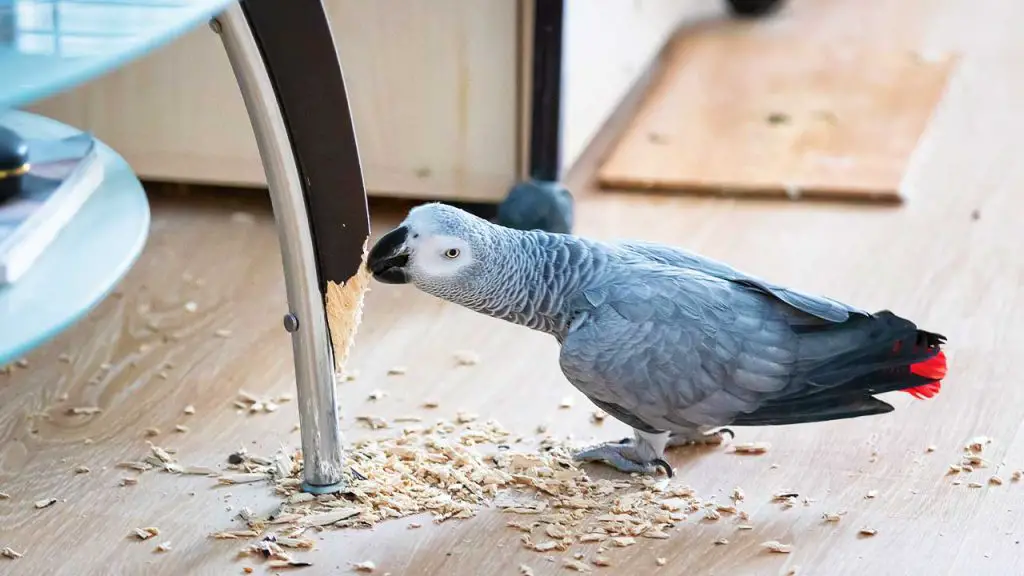
The African Grey parrot’s average lifespan of 40 to 60 years makes them good long-term companions for those who are willing to invest time, effort, and love into their care.
With the right environment, nutrition, mental stimulation, and social interaction, African Greys can be great companions, enriching the lives of their human families for decades to come.
How to Maintain a Peaceful Aviary

Look Out For These Signs of Aggression
It is important to be able to recognize signs of aggression in your African Grey and other birds in the aviary. Some common signs of aggression include:
- Feather plucking or biting
- Squawking, hissing, or growling
- Flapping wings or lunging at other birds
- Blocking access to food, water, or perches
If you notice any of these behaviours, it is important to take action to prevent further aggression and conflict.
How to Prevent Aggression In These Birds
One of the best ways to prevent aggression in your aviary is to provide enough space and resources for all birds. Make sure there are plenty of perches, food bowls, and water sources available so that birds do not need to compete for these resources.
Also, make sure the cage or aviary is large enough for all birds to move around and fly freely without bumping into each other.
Another way to prevent aggression is to introduce new birds gradually. Allow birds to get used to each other’s presence before allowing them to interact. When introducing new birds, make sure to supervise them closely and be prepared to separate them if necessary.
How to Resolve Conflict Between Birds
If aggression and conflict do occur in the aviary, it is important to take action to resolve the issue. One option is to separate the birds involved in the conflict into different cages or aviaries. This can give them space to calm down and prevent further aggression.
Another option is to try to identify the root cause of the aggression and address it. For example, if birds are fighting over food, provide multiple food bowls or spread food out throughout the aviary to reduce competition. If birds are fighting over perches, add more perches or rearrange them to provide more space.
Finally, it is important to seek advice from a veterinarian or avian behaviourist if aggression and conflict persist. They can provide guidance on how to manage the situation and prevent future issues.
Do African Greys Get Along with Other Birds? – FAQs
Do African Greys and Cockatoos Get Along?
African Greys and Cockatoos are two of the most popular parrot species, and many people wonder if they can live together peacefully. While every bird is different, there are some general guidelines to follow when introducing African Greys and Cockatoos to each other.
Firstly, it’s important to note that African Greys and Cockatoos have different personalities and temperaments. African Greys are known for being intelligent and independent, while Cockatoos are known for being affectionate and social. This means that they may not always get along, and there is a risk of aggression or territorial behavior.
However, with proper introductions and socialization, African Greys and Cockatoos can live together peacefully. It’s important to introduce them slowly and in a neutral environment, such as a room that neither bird has claimed as their own.
Supervision is key during the introduction process, and any signs of aggression should be addressed immediately.
It’s also important to provide each bird with their own space and resources, such as separate cages, food bowls, and toys. This can help prevent competition and reduce the risk of aggression.
Overall, while African Greys and Cockatoos can get along, it’s important to approach the introduction process with caution and patience. Every bird is unique, and it’s important to monitor their behavior and adjust accordingly.
Do African Greys Get Along With Cockatiels?
African Greys are known for their intelligence and social nature. They can get along with other birds, including cockatiels, but it depends on the individual birds’ personalities and how they are introduced to each other.
It’s possible for African Greys and cockatiels to live together peacefully. Cockatiels are significantly smaller than African Greys, so it’s important to supervise them when they are interacting. If your African Grey takes to your cockatiel, they can coexist quietly. However, if your African Grey dislikes the cockatiel or becomes aggressive, it can cause harm to the smaller bird.
When introducing an African Grey to a cockatiel, it’s important to do so slowly and carefully. Start by placing their cages near each other so that they can get used to each other’s presence. Once they seem calm and comfortable, allow them to interact under close supervision. If they get along well, you can gradually increase their time together.
It’s important to provide both birds with their own space and resources, including food and water dishes, toys, and perches. This can help prevent any territorial behavior or aggression.
Can an African Grey Live with a Macaw?
African Greys and Macaws are both popular pet birds, but they have different personalities and requirements. While it is possible for them to live together, it’s not always a good idea. Here are some factors to consider:
* Size and Space: Macaws are much larger than African Greys and require a lot of space. They need a cage that is at least 5 feet tall and 3 feet wide. African Greys are smaller and need a cage that is at least 3 feet tall and 2 feet wide. If you plan to keep them in the same cage, it should be large enough to accommodate both birds comfortably.
* Temperament: African Greys are known for their intelligence and sensitivity, while Macaws are known for their loudness and playfulness. They have different temperaments and may not get along. It’s important to introduce them slowly and supervise their interactions.
* Diet: Macaws and African Greys have different dietary requirements. Macaws need a diet that is high in fat, while African Greys need a diet that is high in protein. It’s important to provide them with the right food and supplements to keep them healthy.
If you decide to keep an African Grey and a Macaw together, make sure to provide them with plenty of toys and activities to keep them entertained. You should also give them separate food and water dishes to avoid any conflicts. It’s important to monitor their behavior and make sure they are getting along.
Overall, while it is possible for an African Grey and a Macaw to live together, it’s important to consider their individual needs and personalities. If you’re not sure if they will get along, it’s best to keep them in separate cages.
Can African Grey Parrots Live Alone?
African grey parrots are highly social birds and thrive on social interaction. They are intelligent and require mental stimulation to avoid boredom and destructive behavior. While African greys can be raised as lone pets, it is not recommended as it can lead to negative behaviors such as aggression, screaming, and feather plucking.
Owners who must keep their African grey parrot alone should ensure that they provide enough attention and social interaction. This can include daily playtime, training, and regular interaction with their owners. Owners can also consider providing their African grey with toys and puzzles to keep them mentally stimulated and engaged.
If an owner cannot provide enough attention and social interaction, it is recommended to consider getting a second African grey parrot as a companion.
African greys can thrive in pairs and living with another bird can provide the necessary social interaction and mental stimulation.
Do African Grey Parrots Need a Companion?
African Grey parrots are social birds and enjoy the company of other birds. However, not all African Greys will get along with other birds. Some may be territorial and aggressive towards other birds, while others may be more accepting and enjoy the company of a companion.
If you are considering getting another bird as a companion for your African Grey, it is important to introduce them slowly and carefully. It is recommended to keep them in separate cages initially and let them interact under supervision. If they show signs of aggression towards each other, it may not be a good idea to keep them together.
It is also important to note that even if your African Grey enjoys the company of another bird, they still need plenty of interaction and attention from their human companions. Having a companion bird should not replace the time and attention you give to your African Grey.
If you are unable to provide your African Grey with the attention and interaction they need, getting a companion bird may not be the best solution. It is important to consider the needs and personalities of both birds before making a decision.
What Birds Can Live with African Greys?
Living in pairs can be beneficial for an African Grey’s health, but not all birds will get along with them. When choosing a companion bird for your African Grey, it’s important to consider the size, temperament, and behavior of the potential bird.
Some birds that may be compatible with African Greys include:
* Senegal Parrots
* Meyer’s Parrots
* Caiques
* Pionus Parrots
* Eclectus Parrots
It’s important to note that even if a bird is considered compatible, there is no guarantee that they will get along. Each bird has its own personality and preferences, and it’s important to introduce them slowly and carefully to ensure a successful relationship.
Additionally, it’s important to provide enough space for multiple birds. The cage should be large enough to accommodate all birds comfortably, with enough perches and toys to prevent boredom and aggression.
Overall, while African Greys may not get along with every bird, there are compatible options available. By considering the size, temperament, and behavior of potential companions, and providing enough space and resources, you can help ensure a happy and healthy environment for your birds.


